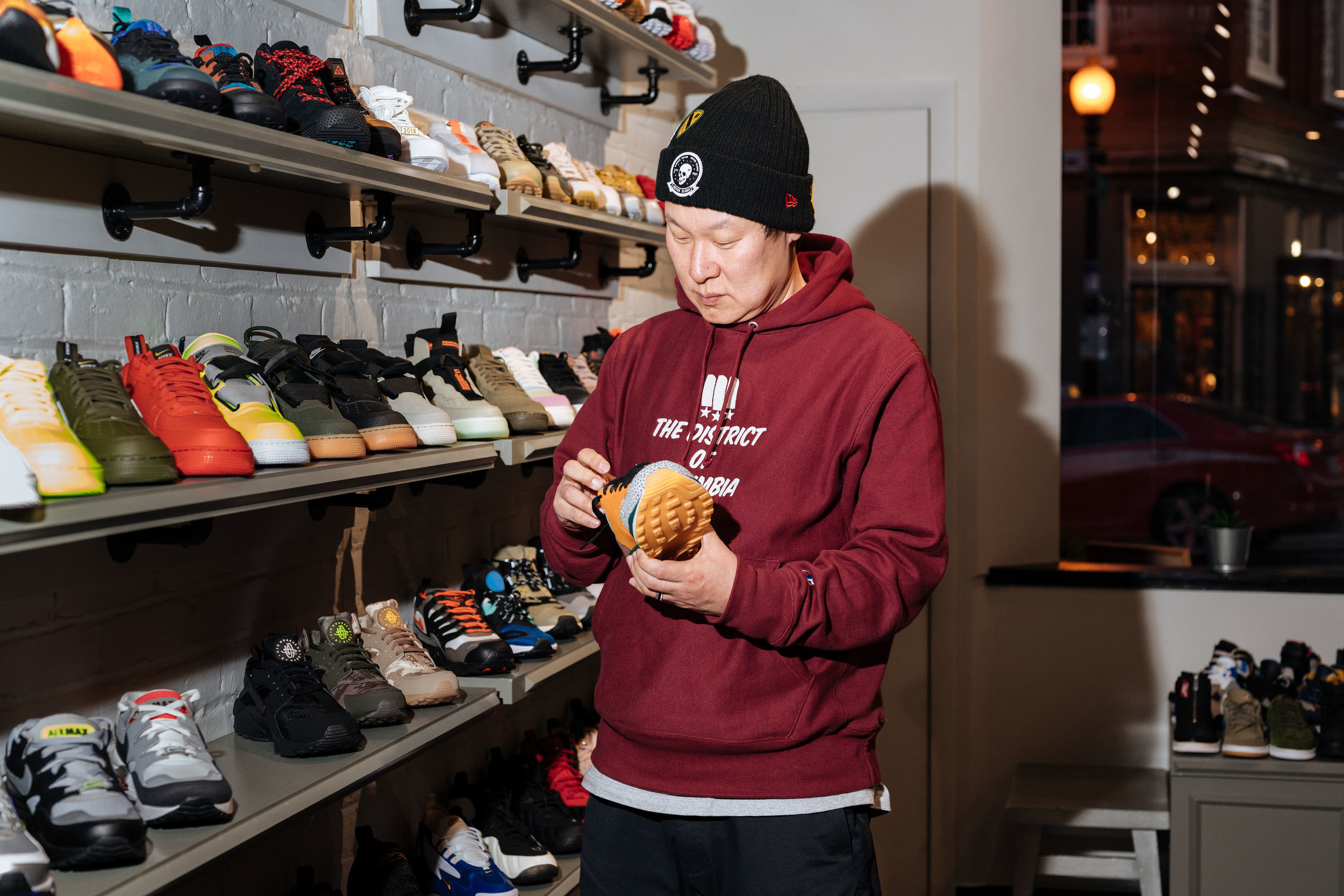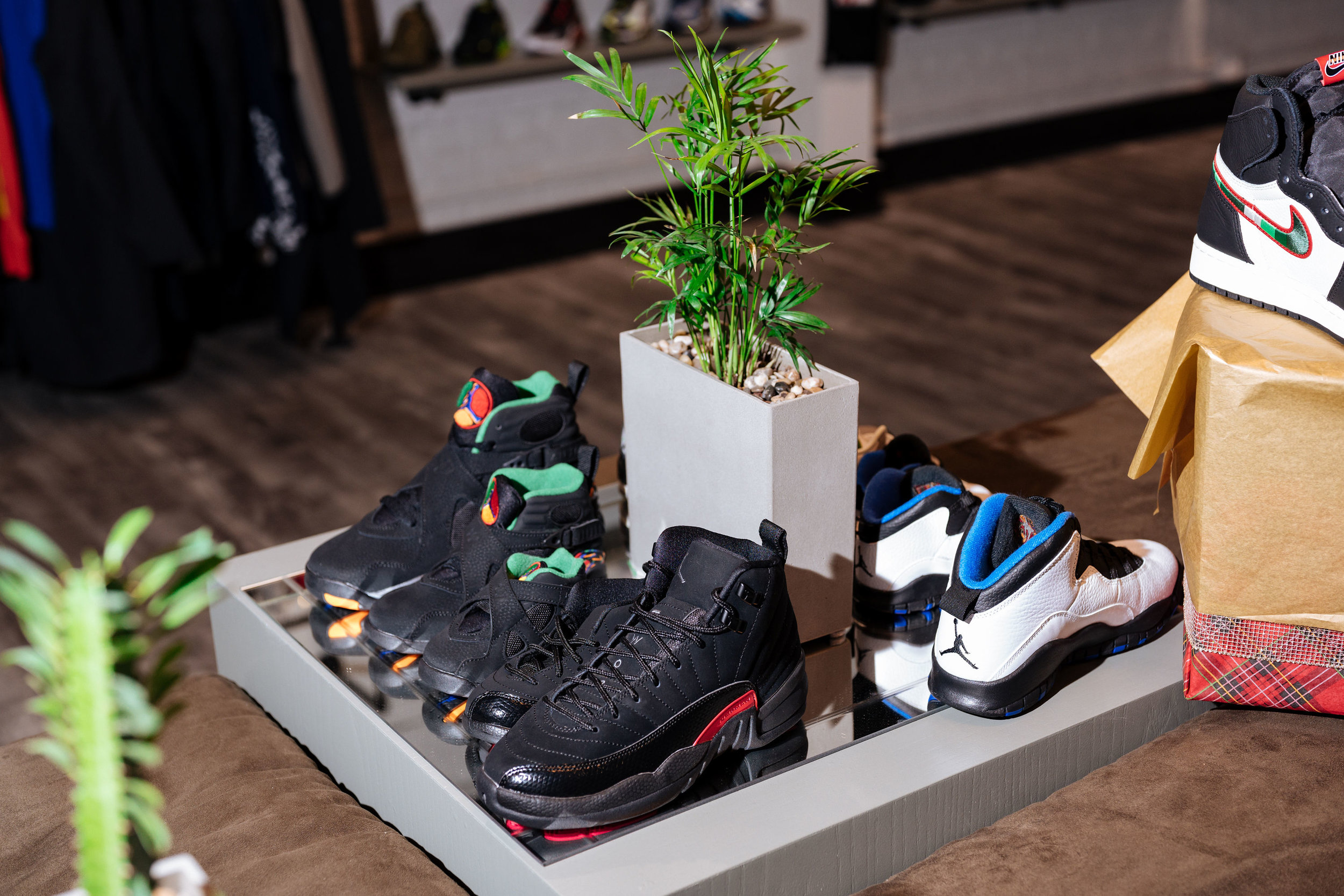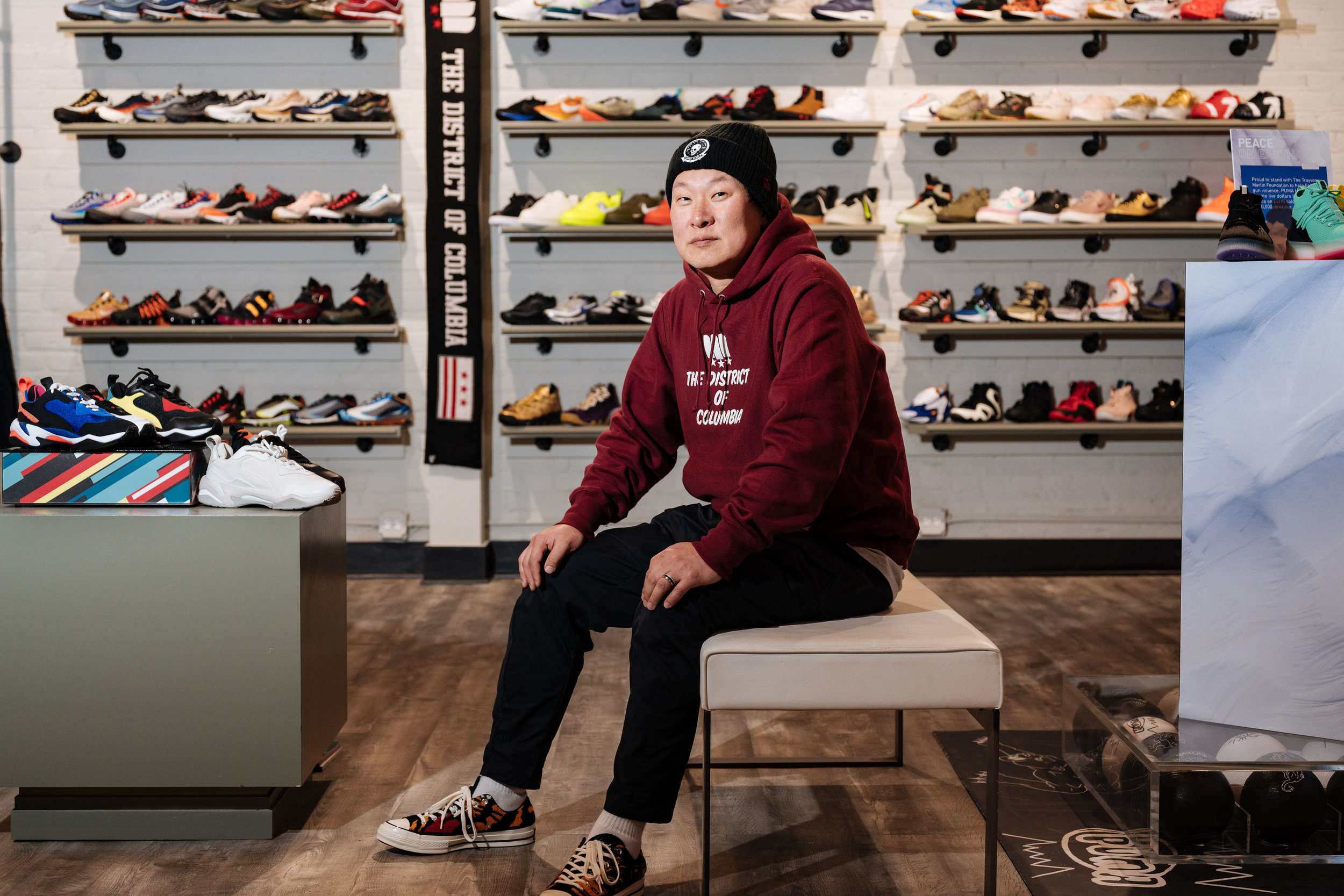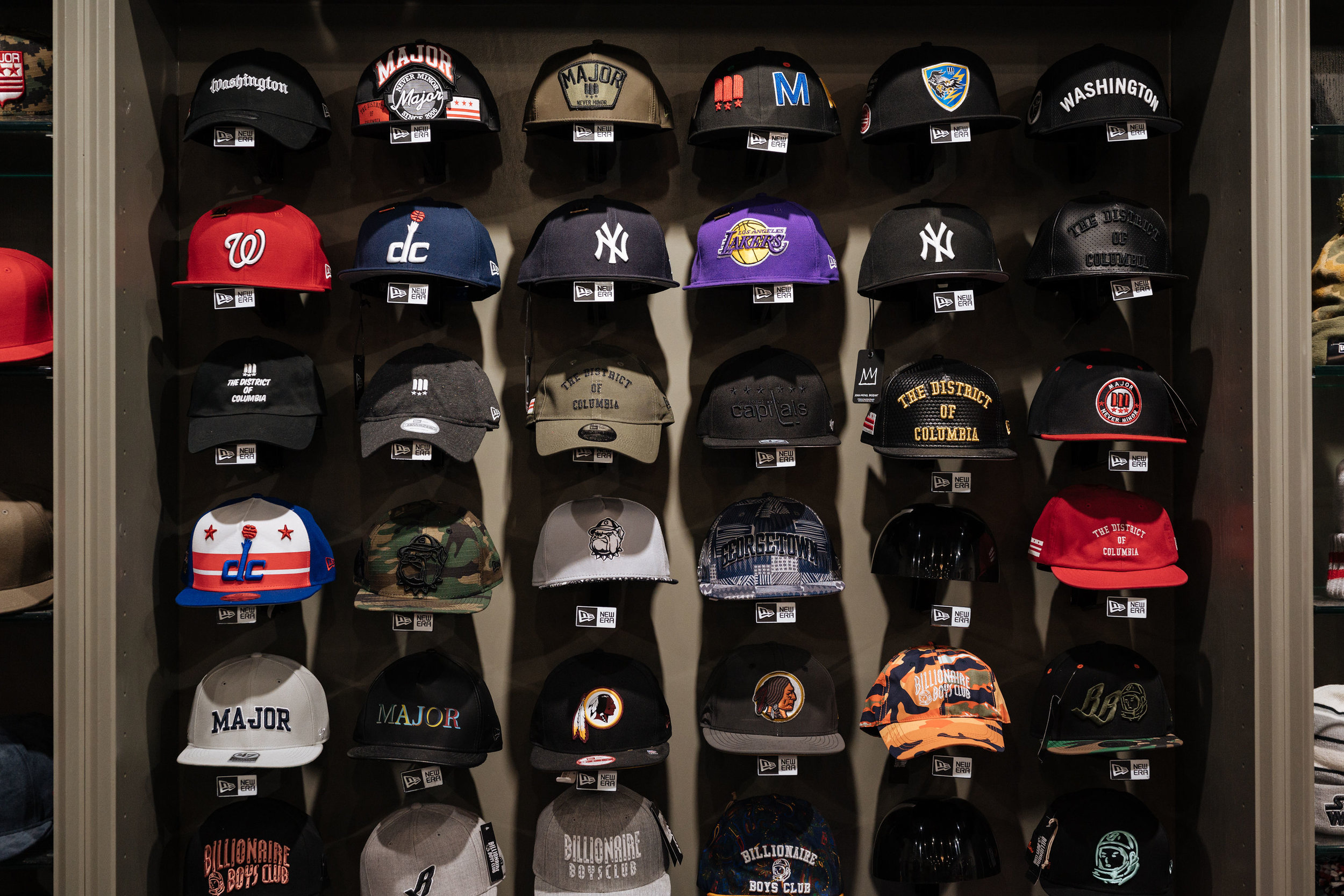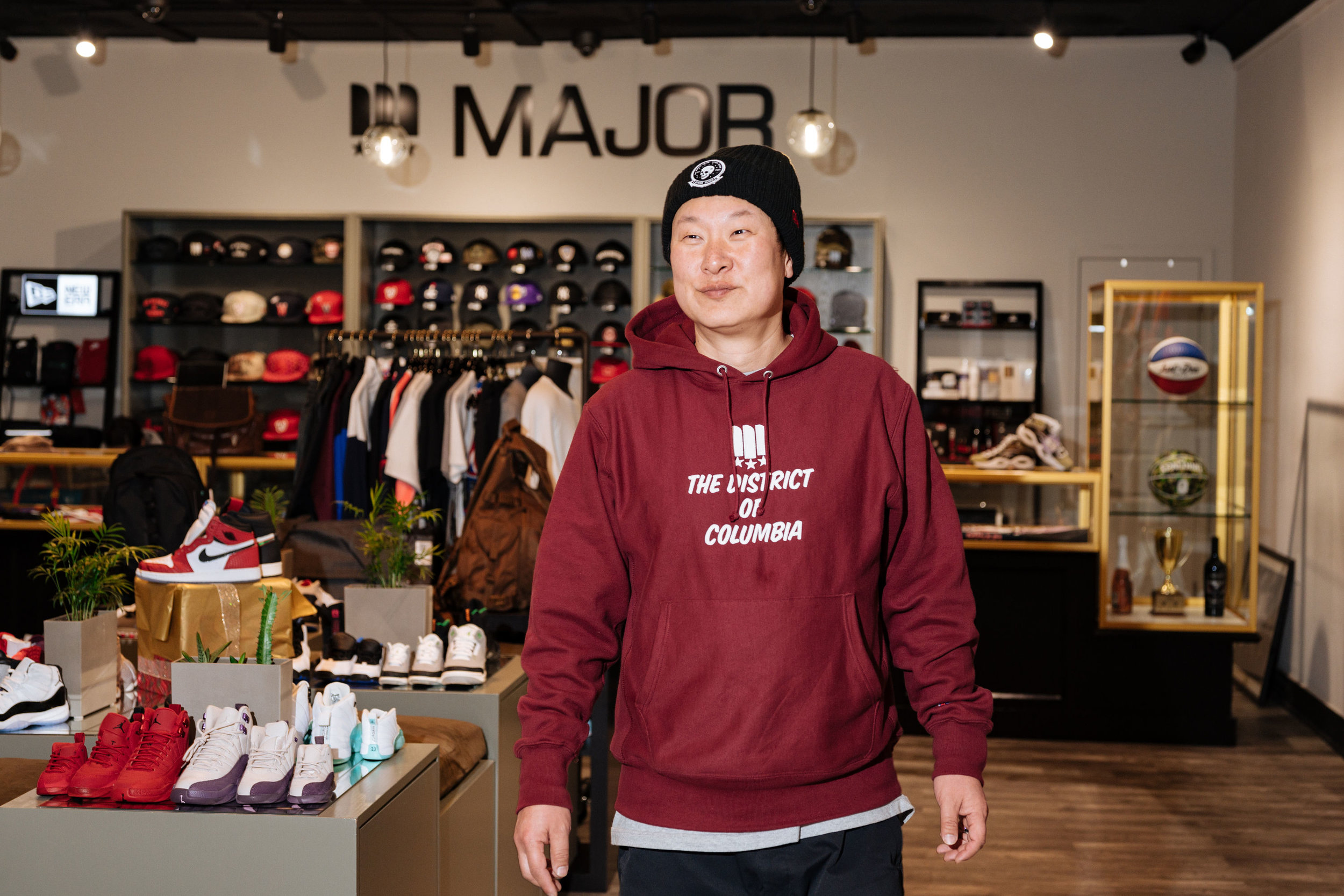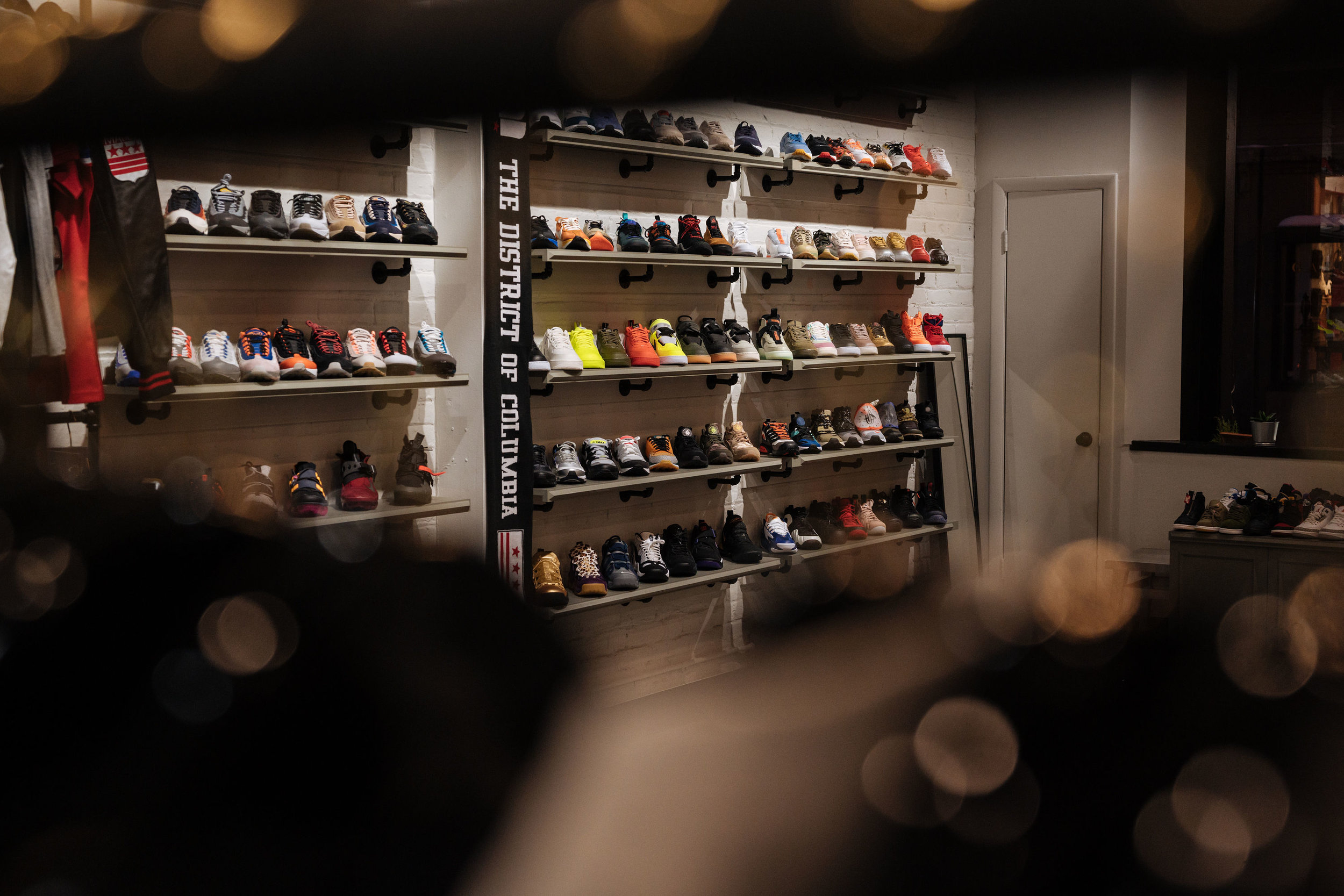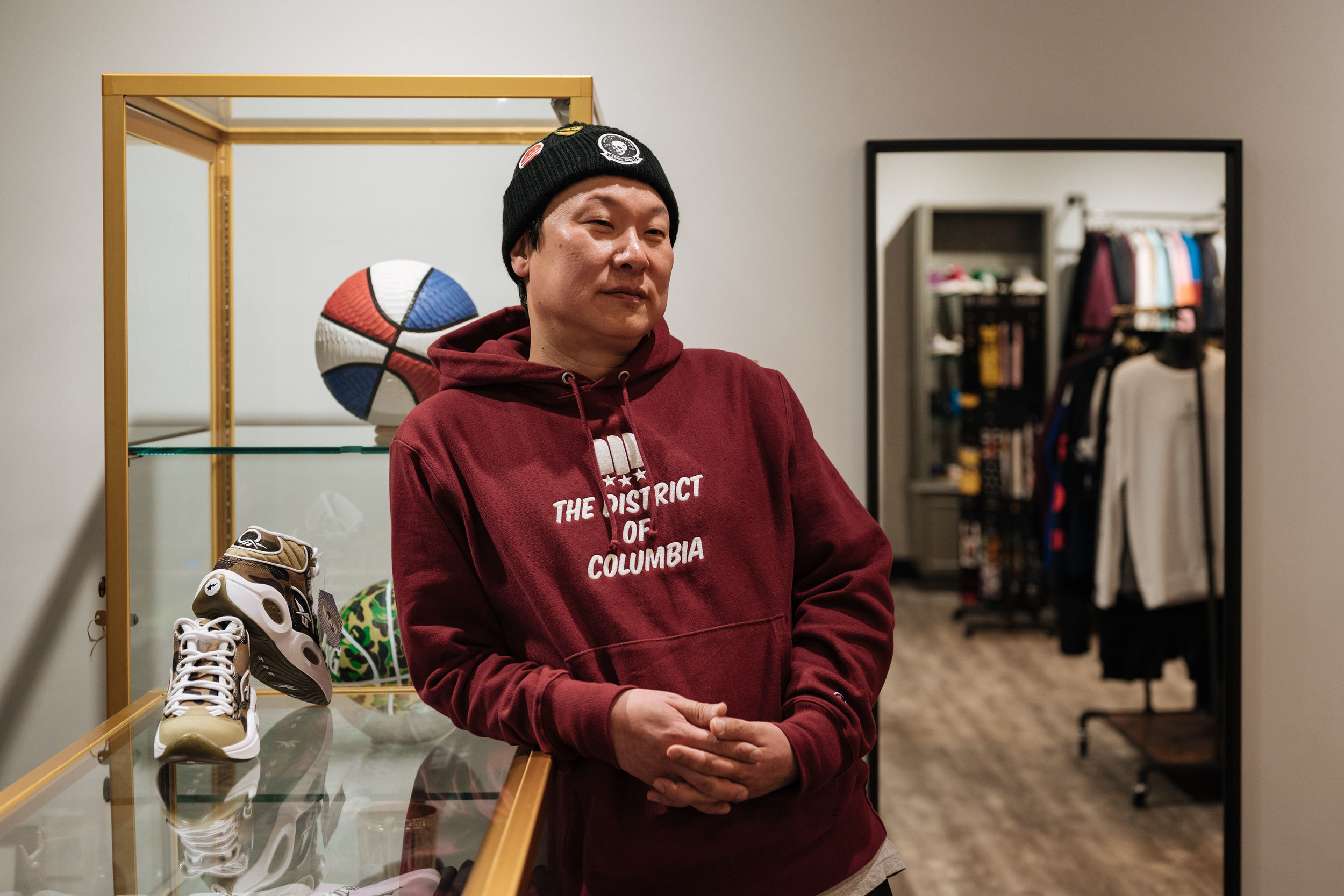‘I Have Thousands of Sneakers’
Days after his family emigrated from Seoul in 1980, 12-year-old Duk-ki Yu picked up a pair of Adidas Country runners—his first name-brand sneakers.
He’d only seen select athletes wearing Adidas in Korea—the start of the pervasive culture shock Duk-ki would experience in California.
‘I came from a very dense and populated city, and then I was living in Pacific Grove, in the Monterey Peninsula, next to Pebble Beach. We were immigrants and never got to partake in any of that great stuff. Now I go back and I’m like, ‘Wow, this is amazing,’ but as a teenager I really hated it.’
San Francisco offered the nearest access to urban culture. By college, Duk-ki was making monthly sneaker-hunting trips to the city, DJ’ing after school, and planning his escape to the East Coast.
After graduation, he moved to DC and enrolled in Georgetown’s business school—unknowingly paving the start of an unexpected path that would culminate in his own sneaker store 25 years later. At the time, he simply loved the rich culture around him.
‘R&B was playing on the radio, and shops were catering to urban fashion. Next to New York, it was the most vibrant city on the East Coast, but not as intimidating or big.’
While still in school, Duk-ki threw himself in the entertainment world. He made weekly trips to New York City and began networking at record companies. Eventually, he was hired to promote the records in DC.
‘Hip hop wasn’t the business it is today. It was a burgeoning scene, and now I had access to it. I started hauling records around and visiting DJs at Howard University, night clubs, and radio stations. At 25, there was an opportunity for me to hustle and make better money than getting a corporate job.’
Duk-ki honed his presentation skills, walking rap records into R&B stations and convincing production assistants to play them if he cut out all the swearing. Hip hop began influencing mainstream culture, and by the mid-90s, Duk-ki was hanging out with the likes of Russell Simmons, meeting influencers, and talking all things fashion and sneakers.
‘You always have to stand out when you’re around artists. Kids nowadays still want to flex on people and they do it through social media. Those days, the moment you walked into a club or got on a subway train, people had to notice you. That’s how you flexed how much influence you had. That’s when I learned how to put my outfits together.’
As street wear became more established, Duk-ki invited designers to follow him and his musician friends on the road, giving out their promo gear to college athletes through grassroots marketing. Along the way, Duk-ki’s rare sneaker collection grew.
‘There were West Coast shop guys who went to Japan or Europe to buy up sneakers and bring them back in duffel bags and sell them in boutiques. I saw that example. These were all rare sneakers. The idea went off in my head that there are other people like me out there. But I had no idea I was ever going to sell sneakers.’
Eventually, Duk-ki pivoted to start his own advertising and marketing agency, promoting cars, soft drinks, and liquor. There, he was approached by Reebok.
‘They asked me to seed some product on some of the artists I was working with. It was a no-brainer. I could order as much product as I want, I could design and lay out the marketing plans on the street side, and hire staff to go out and do guerilla executions. It was an ideal situation to get my foot in the door with that side of the business.’
BET was still headquartered in DC, and Duk-ki called on his connections there to set up a makeshift office in their greenroom. When an artist was in town to perform on the network, Duk-ki would go down that afternoon and outfit every background dancer and entourage member.
‘Those guys are the most neglected part, but if you’re a star surrounded by everyone who’s wearing a brand, you start thinking about that brand being relevant.’
The following year, Duk-ki and a friend from Nike went on a hip hop station in San Francisco to talk about sneakers. The experience was surreal.
‘The calls lit up. Nas and Redman were waiting to get interviewed, and the DJ was such a sneaker guy that he told them to chill out and wait. The interview lasted an hour and a half, talking about sneakers and what it means to hip hop and the Bay area. I realized there’s a business there, and a business model.’
And yet, it would be another decade before Duk-ki opened his own store on Wisconsin Avenue.
In the years between, he consulted for Internet start-ups and ran a marketing campaign for Electronic Arts—procuring artists and promo deals, and working with radio stations on various launches. All of his worlds were finally integrated—culminating in 2002 when Duk-ki designed a shoe with Nike for a video game release.
Nike gave him hundreds of pairs to seed—hand-delivering them to Puffy, Damon Dash and Swiss Beatz, among others. The campaign blew up—and gave Duk-ki an idea.
‘For consumers at that time, there was this whole thing about eBay dictating what’s hot. We came up with this idea to hire 15-year-old kids from these message boards who talked about sneakers, and I started sending them free shoes. I said you can keep a pair and list a pair on eBay and see how much you can get. You can keep that money. They started seeing these shoes go for thousands and everyone got hyped. I thought, ‘What can I do with this?’’
There were shops in New York that had evolved to full-fledged sneaker boutiques, but there was nothing like it in DC. Kids were always asking Duk-ki about his shoes, and he knew he finally had to capitalize.
With a wife, two young children, and his own agency, Duk-ki planned to hire a few young guys to run a new sneaker and street wear store called MAJOR. He would simply provide the business acumen and relationships. But by that time his partners got cold feet, Duk-ki had already signed both a lease and contract with Nike, and commissioned a logo design. He had no choice but to leave the agency work behind, and devote himself to MAJOR.
‘The anticipation was bubbling up in the sneaker subculture, and we probably had 60 kids lined up in 2006 when we ripped the brown paper down on our store window. It was the first sneaker boutique and street wear boutique in DC where skater kids or DJ kids could also shop for cool t-shirts and track suits.’
Duk-ki relied on years of relationship-building, from surf and skate brands in California to hip hop brands in New York City, and knew he could curate his collection better than anyone else.
‘I’ve always had a clear understanding of where I stand as a merchant compared to everyone else. As a boutique, you’re in charge of introducing and educating the consumer. Brands aren’t going to make tons of money off of you with the small batches, and you’re not going to make tons of money. It’s all the good things that come with building the community and building a brand, or building a culture within a brand.’
Today, MAJOR welcomes new product daily, but Duk-ki remains the constant on the floor—connecting with an increasingly younger and more fashionable demographic to introduce them to the right sneakers.
‘I’m providing them with an experience you can’t get on social media. I’m helping them figure out their look, or give them the recollection pointers to why a shoe is important or this design is relevant—and that’s lost in today’s mass-merchandise world. I’ve gone through a lot of culture moments, and that resonates with my customer.’
Duk-ki understands the transformative power of his business, and a single pair of sneakers. At best guess, he owns thousands—stored in an apartment and a warehouse—but still remembers when Air Jordans hit the shelves in 1985.
‘They were like the culmination of hip hop culture and basketball. They looked so different from anything else, and yet you could walk into a Foot Locker in the mall and buy them. And I remember going back to Korea for the first time in 1988 and my uncle bought me the original Air Max 1’s. I still have that shoe somewhere.’
Much of Duk-ki’s collection serves as both a time capsule and an inspiration board for new, exclusive collaborations, including the Washington Capitals shoes he designed with Reebok during the 2017 playoffs. The sneakers were released as the Caps were on the brink of elimination against the Penguins, symbolizing a rallying cry for 400 fans who lined up outside of the store to get a pair.
They meant more than rubber and laces. They always do.
‘Sneakers are definitely your personal expression, but it’s also what you base your outfit on. You start with the shoes, then you go with the hat or accessory part, then you throw on either camouflage pants, a nice pair of denim or sweats. That’s the three options when you’re a sneaker guy. After that, you figure out what you’re going to wear on top. But it all really starts with the shoes.’
